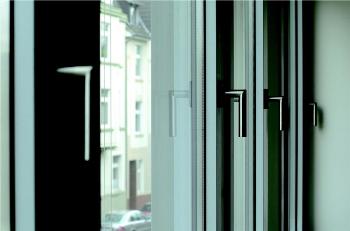A new wireless and clean energy using window contacts system developed by the research scientists at the Fraunhofer Institute is expected to bring in relief to the house owners who are worried about proper closing of their windows especially during unfavorable weather conditions.
 Wireless window contacts – no maintenance, no batteries. Credit: Fraunhofer Institute
Wireless window contacts – no maintenance, no batteries. Credit: Fraunhofer Institute
The newly developed window contacts system utilizes inbuilt sensors that function by utilizing the clean energy from radio signals close by and does not require running of connecting wires or storage batteries to function. The petit electronic sensors equipped onto the window handles, will caution on closed, tilted open or fully open positions of windows. The information from the contact systems are sent to a centrally located base station to enable the house owner to know the position of windows at a glance.
The wireless window contacts systems presently available in the market depend on solar power or batteries for their functioning and both the methods suffer from inherent drawbacks such as power generation problems during sun-light shadow periods and requirement to change batteries used regularly. Also the installation of solar panels over the existing constructions poses aesthetic and retrofit problems.
The window contacts system developed at the Fraunhofer Institute for Microelectronic Circuits and Systems IMS in Duisburg, by the research scientists are different to the existing systems and the sensor arrangement in the systems does not require batteries to power or external wiring connectivity and can be easily placed concealed. The transmitter module included in the series receives and transmits data from window contacts and also supplies them the needed energy through the radio signal. The room controller installed in the room sends the data obtained from the window sensors to a central base station located in the building to assist the house owners to know the window status and DSL connectivity to the systems enables remote querying of data through a smartphone.
The researchers have overcome the problem of lack of radio output in the development stage by accurate tuning of the components, antennas in all the sensor modules to manage their functions even from considerable distances. The IMS scientists have already completed a prototype model and are trying to incorporate other sensors such as room temperature regulators within the system to manage the right temperature within the building.
Source: http://www.fraunhofer.de/en/